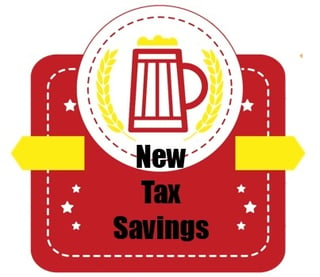 Brewers, vintners and distillers should all say “cheers” to the new federal tax laws.
Brewers, vintners and distillers should all say “cheers” to the new federal tax laws.
The Tax Cuts and Jobs Act, signed into law last month, lowers taxes on just about every alcohol producer, including craft brewers, hard cideries and mead makers.
The new tax rates went into effect Jan. 1, 2018 and expire Dec. 31, 2019. Below are the changes:
Beer
- For small brewers (those brewing less than 2 million barrels a year), federal taxes drop from $7 a barrel to $3.50 a barrel on the first 60,000 barrels a year.
- From 60,000 up to 6 million barrels, taxes drop from $18 to $16 a barrel.
- Federal taxes remain unchanged at $18 a barrel for producers or importers of more than 6 million a year.
- The act also allows beer to be transferred between bonded premises without paying tax, even if the premises are not commonly-owned, as long as the transferee accepts responsibility for any required tax payment.
READ MORE: Top 10 Tax Tips for Beer Brewers
Wine
-
 The act does away with the existing phase out based on production size and allow all wineries to claim a tax credit of between $.535 and $1 per gallon on the first 750,000 gallons of production. The total value of the full credit is $451,700 per year, based on producing the full 750,000 gallons, according to the Wine Institute.
The act does away with the existing phase out based on production size and allow all wineries to claim a tax credit of between $.535 and $1 per gallon on the first 750,000 gallons of production. The total value of the full credit is $451,700 per year, based on producing the full 750,000 gallons, according to the Wine Institute. - For the first time, sparkling wine is eligible to receive the tax credits mentioned above.
- Hard cider makers also get tax credits of between $.30 and $.62 per gallon on the first 750,000 gallons of production.
- Mead and sparkling wine with more than .392 grams of carbon dioxide per millimeters used to be taxed at a minimum rate of $3.30 per wine gallon. Now, all mead and low alcohol volume wine containing not more than 0.64 grams of carbon dioxide per 100 millimeters and less than 8.5% alcohol by volume will be taxed at $1.07 per wine gallon.
- The act increases the Alcohol by Volume (ABV) allowed for the $1.07 tax rate from 14% to 16% ABV. Wines with 14% to 16% ABV are currently taxed at $1.57 per gallon and will now be taxed at the still wine rate of $1.07.
Spirits
Instead of being taxed at a straight $13.50 per proof gallon, the act creates a tiered rate:
- On the first 100,000 proof gallons, the tax is $2.70 a gallon
- For above 100,000 but below 22.13M proof gallons, the tax is $13.34 a gallon
- For all additional amounts, the rate is $13.50 a proof gallon.
- The act also allows distilled spirits to be transferred in bond between bonded premises without paying tax, regardless of whether the distilled spirits are bulk distilled spirits.
While these tax benefits are scheduled to last only two years, they’re well timed with the many other business tax breaks included in the Tax Cuts and Jobs Act. The next few years are a great time to buy business equipment, as more generous business asset expensing and depreciation tax breaks are now available.
The maximum Section 179 deduction increases to $1 million, and the phaseout threshold amount is increased to $2.5 million (from $510,000 and $2.03 million respectively). There are also much better first-year bonus depreciation rules. Read more about these changes here.





